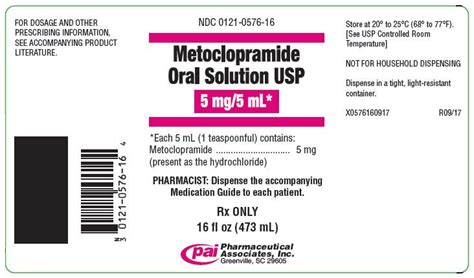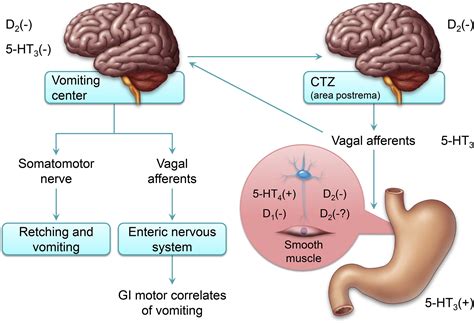Intro
Discover Metoclopramide uses, a medication for nausea, vomiting, and gastroparesis treatment, offering relief from digestive issues and promoting gut motility, with benefits for patients seeking gastrointestinal comfort and symptom management.
The world of pharmaceuticals is vast and complex, with numerous medications available to treat a wide range of health conditions. One such medication is metoclopramide, which has been used for decades to treat various gastrointestinal disorders. Despite its widespread use, many people are unaware of the full range of metoclopramide uses and benefits. In this article, we will delve into the importance of metoclopramide, its working mechanisms, and the various conditions it can treat.
Metoclopramide is a medication that belongs to the class of drugs known as dopamine antagonists. It works by blocking the action of dopamine, a neurotransmitter that plays a key role in regulating digestive function. By blocking dopamine, metoclopramide helps to increase the movement of food through the digestive system, reducing symptoms such as nausea, vomiting, and abdominal discomfort. This makes it an effective treatment for a range of gastrointestinal disorders, including gastroesophageal reflux disease (GERD), gastroparesis, and chemotherapy-induced nausea and vomiting.
The importance of metoclopramide cannot be overstated, as it has improved the lives of millions of people worldwide. For individuals suffering from debilitating gastrointestinal symptoms, metoclopramide offers a beacon of hope, providing relief from discomfort and improving overall quality of life. Furthermore, metoclopramide has been shown to be effective in treating a range of other conditions, including migraines, cyclic vomiting syndrome, and radionuclide imaging. As we explore the various metoclopramide uses, it becomes clear that this medication is a valuable tool in the treatment of numerous health conditions.
What is Metoclopramide Used For?

Metoclopramide is used to treat a range of gastrointestinal disorders, including gastroesophageal reflux disease (GERD), gastroparesis, and chemotherapy-induced nausea and vomiting. It works by increasing the movement of food through the digestive system, reducing symptoms such as nausea, vomiting, and abdominal discomfort. Additionally, metoclopramide has been shown to be effective in treating other conditions, including migraines, cyclic vomiting syndrome, and radionuclide imaging.
Benefits of Metoclopramide
The benefits of metoclopramide are numerous, making it a valuable treatment option for individuals suffering from gastrointestinal disorders. Some of the key benefits include: * Rapid relief from nausea and vomiting * Improved digestion and reduced abdominal discomfort * Increased movement of food through the digestive system * Effective treatment for a range of gastrointestinal disorders * Can be used to treat other conditions, such as migraines and cyclic vomiting syndromeHow Does Metoclopramide Work?

Metoclopramide works by blocking the action of dopamine, a neurotransmitter that plays a key role in regulating digestive function. By blocking dopamine, metoclopramide helps to increase the movement of food through the digestive system, reducing symptoms such as nausea, vomiting, and abdominal discomfort. This makes it an effective treatment for a range of gastrointestinal disorders.
Metoclopramide Side Effects
While metoclopramide is generally well-tolerated, it can cause side effects in some individuals. Common side effects include: * Dizziness and drowsiness * Headache and fatigue * Nausea and vomiting * Abdominal discomfort and diarrhea * Increased risk of tardive dyskinesia, a condition characterized by involuntary muscle movementsMetoclopramide Uses in Gastrointestinal Disorders

Metoclopramide is commonly used to treat a range of gastrointestinal disorders, including:
- Gastroesophageal reflux disease (GERD)
- Gastroparesis
- Chemotherapy-induced nausea and vomiting
- Cyclic vomiting syndrome
- Radionuclide imaging
Metoclopramide Dosage and Administration
The dosage and administration of metoclopramide vary depending on the condition being treated. Typically, metoclopramide is taken orally, 30 minutes before meals, and at bedtime. The usual adult dosage is 10-15 mg, 3-4 times daily.Metoclopramide Interactions and Contraindications

Metoclopramide can interact with other medications, including:
- Anticholinergic agents
- Opioids
- Sedatives
- Antihistamines
- Monoamine oxidase inhibitors (MAOIs)
Additionally, metoclopramide is contraindicated in individuals with:
- Pheochromocytoma
- Epilepsy
- Parkinson's disease
- Breast cancer
- Pregnancy and breastfeeding
Metoclopramide Warnings and Precautions
Metoclopramide can cause serious side effects, including: * Tardive dyskinesia * Neuroleptic malignant syndrome * Extrapyramidal symptoms * Increased risk of stroke and transient ischemic attackIt is essential to monitor patients closely for signs of these conditions and to adjust the dosage or discontinue treatment if necessary.
Metoclopramide and Pregnancy

Metoclopramide is contraindicated in pregnancy, as it can cause fetal harm. However, in some cases, the benefits of metoclopramide may outweigh the risks, and it may be prescribed to pregnant women under close medical supervision.
Metoclopramide and Breastfeeding
Metoclopramide is also contraindicated in breastfeeding, as it can pass into breast milk and cause harm to the infant. However, in some cases, the benefits of metoclopramide may outweigh the risks, and it may be prescribed to breastfeeding women under close medical supervision.Metoclopramide Alternatives

For individuals who are unable to take metoclopramide or experience adverse effects, there are alternative treatments available. These include:
- Domperidone
- Ondansetron
- Granisetron
- Metoclopramide alternatives for nausea and vomiting
- Metoclopramide alternatives for gastroparesis
Metoclopramide Overdose
In the event of a metoclopramide overdose, it is essential to seek medical attention immediately. Symptoms of overdose include: * Dizziness and drowsiness * Headache and fatigue * Nausea and vomiting * Abdominal discomfort and diarrhea * Increased risk of tardive dyskinesia and extrapyramidal symptomsTreatment for metoclopramide overdose typically involves supportive care, such as hydration and monitoring of vital signs.
What is metoclopramide used for?
+Metoclopramide is used to treat a range of gastrointestinal disorders, including gastroesophageal reflux disease (GERD), gastroparesis, and chemotherapy-induced nausea and vomiting.
How does metoclopramide work?
+Metoclopramide works by blocking the action of dopamine, a neurotransmitter that plays a key role in regulating digestive function. By blocking dopamine, metoclopramide helps to increase the movement of food through the digestive system, reducing symptoms such as nausea, vomiting, and abdominal discomfort.
What are the side effects of metoclopramide?
+Common side effects of metoclopramide include dizziness and drowsiness, headache and fatigue, nausea and vomiting, abdominal discomfort and diarrhea, and increased risk of tardive dyskinesia and extrapyramidal symptoms.
As we conclude our exploration of metoclopramide uses, it is clear that this medication is a valuable tool in the treatment of numerous health conditions. Whether you are suffering from gastrointestinal disorders or other conditions, metoclopramide offers a range of benefits and can provide rapid relief from symptoms. We invite you to share your experiences with metoclopramide, ask questions, or seek further information on this topic. By working together, we can promote greater understanding and awareness of metoclopramide uses and benefits, ultimately improving the lives of individuals worldwide.
